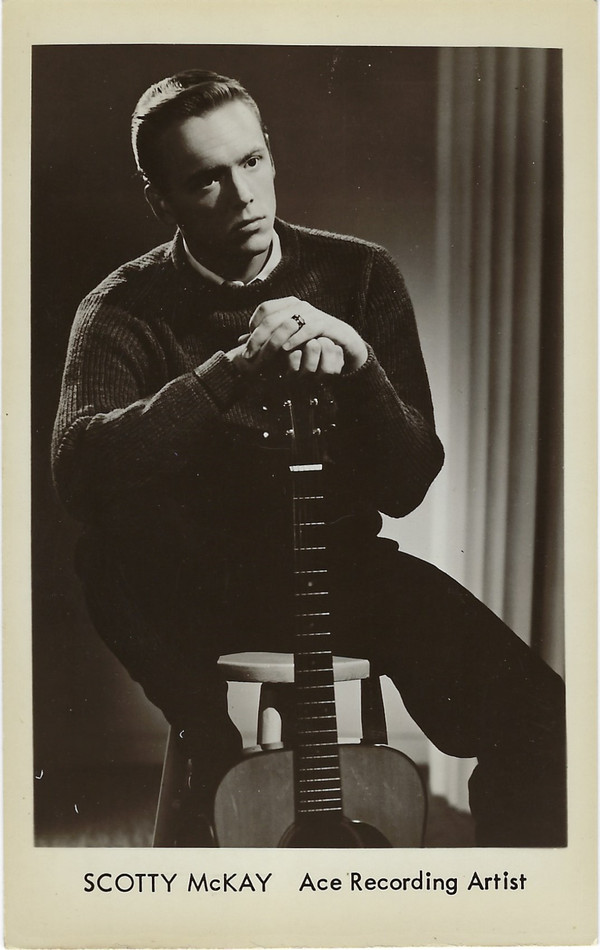Scotty McKay
Настоящее имя: Scotty McKay
Об исполнителе:
American rockabilly musician, born in 1940 in Dallas, Texas, USA, died 17 March 1991 in Dallas, Texas, USA. Musician, guitarist, and pianist known for his energetic, almost frenetic live performances and varying forays into popular music from the 1950s through the 1980s. He is also known as a performer and actor in minor roles for two horror movies in the mid-1960s. Although it is frequently stated that he was born in 1937, public school records as well as marriage and divorce registers record Max K. Lipscomb as born to Maxine Lipscomb on August 20, 1940. Little information is available about Lipscomb's early life, although he spent most of his life in Texas growing up in the Dallas area. Lipscomb entered Hillcrest High School, as a freshman for the 1954–55 school year, where he served on the student council and participated in other extracurricular activities. By the latter half of 1957, at the age of seventeen, however, he was touring as a band member, singing backup vocals and playing rhythm guitar in the “Blue Caps” behind a young Gene Vincent. He appeared with Gene Vincent and the Blue Caps on November 17, 1957, for Vincent's live performance of “Dance to the Bop” on The Ed Sullivan Show. Lipscomb took a hiatus from the Blue Caps in 1958 to go back to school—after which he joined Vincent once more, this time on a forty-day Canadian tour. With Vincent's career somewhat short-lived due to various reasons, in 1959 Lipscomb began to pursue his own career as a recording artist. With his blonde, clean-cut good looks and the impressive Gene Vincent credentials to his advantage, Lipscomb traveled to Philadelphia and sought out the well-known songwriting and music producer duo of Frank Slay, Jr., and Bob Crewe. Crewe and Slay were associated with Philadelphia-based record label Swan Records, which at the time was partially under the ownership of Dick Clark. It was due to Clark's suggestion that Lipscomb changed his professional name, to be known for most of the rest of his life as “Scotty McKay.” McKay's first single, “Rollin' Dynamite” (backed with “Evenin' Time” as the B-side) was released in mid-1959 on Event Records and shortly after was nationally issued on Parkway. This was followed in quick succession by a number of singles on Swan Records, Swan subsidiary Lawn Records, and the Ace record label. Notable recordings on Ace Records are a cover of Chuck Berry's “Brown Eyed Handsome Man” and novelty hit “Olive Learned to Popeye”; a Scotty McKay LP entitled Tonight In Person was also released by Ace Records in 1961. In 1964 McKay released a cover of Ray Charles's “Mess Around” on the Philips label, backed by his Dallas band (billed as the Shutdowns). Later, ever-changing his sound with the times, McKay released a surf record in the mid-1960s (“Waikiki Beach” on HBR Records) and as the 1960s progressed, transitioned easily into the garage rock-and-roll sound that was popular in Texas at the time. In early 1966 McKay and band member Kirby St. Romain wrote and recorded a song entitled “Here Comes Batman,” paying tribute to the popular television show. It was released under “Scotty McKay and His Orchestra” and became a favorite of fans of the television show. In late 1966 Jim McCarty (of Yardbirds fame) produced one of McKay's singles, released in 1967 in the United Kingdom on Columbia records, called “I Can't Make Your Way.” On this record, McKay's transition to the British Invasion style can be clearly heard. He recorded a much-lauded version of “Train Kept A-Rollin',” a song written by Johnny Burnette but frequently (and mistakenly) attributed to the Yardbirds themselves. With this release, McKay and his Quintet pushed his sound to a raw rock-and-roll compendium. A 1968 release, “Truly True” on Pompeii Records, showed the Scotty McKay Quintet demonstrating melodic, smooth harmonies and a more pop-influenced “bubblegum” sound. During the 1960s, McKay continued to perform energetic live shows, which he had been known for since he first started his career as a front man in 1959. In the mid-1960s, a local television show called Sump’n Else and hosted by Ron Chapman aired on WFAA. McKay and his band performed on the show frequently along with other local teen band contemporaries such as Kenny and the Kasuals and the Chessmen (featuring a young Doyle Bramhall and Jimmy Vaughan). In 1966 and 1967 McKay and his band took cameo roles in two Dallas-located low budget horror films. The first was The Black Cat (1966), an adaptation of the Edgar Allen Poe story of the same title, in which McKay sang a song written especially for the film (“Sinner Man”), and reprised his earlier single, “Brown Eyed Handsome Man.” In the television movie Creature of Destruction (1967), the McKay Quintet appeared as the band in a beach party scene. With the advent of the 1970s, Scotty McKay's public career slowed and his personal life underwent significant changes. He became a born-again Christian in 1970; that same year he released a decidedly softer rock single called “High on Life” (on Charay Records). As the 1970s progressed, McKay traveled to Nashville and made a record called God, Texas, Tennessee and Me, which evidenced a striking foray into country music. Public records show that McKay's personal life went through a number of changes in the 1970s as well, with several marriages and divorces on file. In 1990 McKay released what would become his last album, Morning Side of Midnight, his first religious-themed work. He continued to play locally and in church until a heart attack caused his death on March 17, 1991.
Альтернативные названия:
Вариации названий:
Max Lipscomb
-
- 1
- 2
-


